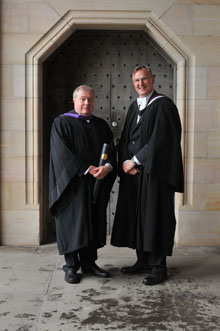Laureation Address – Professor Peter van Inwagen

Professor Peter van Inwagen
Honorary Degree of Doctor of Divinity
Laureation by Professor Alan Torrance
School of Divinity
Tuesday 21 June 2011
Vice-Chancellor, it is my privilege to present Professor Peter van Inwagen for the degree of Doctor of Divinity, honoris causa.
Professor van Inwagen is one of the world’s leading metaphysicians. Indeed, on his last visit to this university, Professor Peter Clark described him as ‘defining the state of play in metaphysics.’ In the words of a contemporary handbook in philosophy, Professor van Inwagen has “contributed significantly to almost every area of research in contemporary metaphysics. Indeed, in the Stanford Encyclopedia of Philosophy he is cited in no less than 77 different articles – testimony to the unique breadth and significance of the impact he has had on the fields of philosophy, metaphysics and philosophical theology.
His influence as a teacher can be seen in the work of several generations of metaphysicians who chose to study with him both at Syracuse University (where he taught from 1971 to 1995) and at the University of Notre Dame (where he is John Cardinal O’Hara Professor of Philosophy). Although he is deeply admired for his incisive acumen as a rigorous supervisor, it has to be said that he is also just a little feared for the same reason – indeed, his doctoral students refer to him as the ‘philosoraptor’!
It is hard to quantify the immense impact that Professor van Inwagen’s essays on modality, ontological commitment, and philosophical methodology have had on contemporary philosophical debates. In addition, he has developed an original and widely discussed metaphysics of ‘creatures of fiction’. The two areas, however, which should be singled out as most indicative of the extent of his impact on metaphysics are those of free will and mereology. In 1975, he produced a powerful defence of incompatibilism at a time when many, if not most, philosophers took it for granted that this position was untenable. In doing so he brought the discussion of free will right back into the centre of philosophical debate making famous what is termed the Consequence Argument – a highly influential argument which is synonymous with his name.
Since the late 1980s, a large proportion of research in metaphysics has concerned mereology – the complex issues which concern how we conceive of the relationship between a whole and its parts. As Professor Zimmerman comments, ‘Van Inwagen’s position is ingenious, original, and defensible….his handling of the Special Composition Question has cast the problems of mereology in a different light.’
But Professor van Inwagen is not merely one of the world’s leading metaphysicians. Following his conversion to Christianity in 1980, he rose to become one of the world’s leading philosophical theologians and one of those most responsible for the sea-change that has taken place in analytic philosophy over the last thirty years. As Quentin Smith, one of the world’s leading atheists, has argued, the last three decades have seen nothing less than the desecularisation of analytic philosophy to the point where in the United States one in four analytic philosophers are now theists. When I studied philosophy, one could count on the fingers of a mutilated hand the number of non-closet Christian philosophers. Now there are over 4,000 members of the societies established for academic philosophers who are Christians, five new refereed journals in the field and myriad monographs written by Christian philosophers to be found in the catalogues of OUP, CUP and other leading academic publishers. Professor van Inwagen is the most significant philosopher of religion amongst the present generation of Christian philosophers and has published on the Trinity, incarnation, resurrection, divine providence, evolutionary theory, personal identity and critical New Testament scholarship. Most fully, however, he has addressed what is regarded as the fundamental atheological challenge to Christian theism, namely, the problem of evil. This he addressed both in his Wilde Lectures in the University of Oxford and in his Gifford Lectures here in the University of St Andrews and which he published in 2006.
A great deal more can be said. Let me end, however, by citing two of his most distinguished peers. Eleanor Stump, on hearing of his honorary degree wrote as follows. ‘Where others add to confusion by obfuscating what is already unclear, Peter illuminates foundational issues with seemingly effortless clarity and philosophical sophistication. His powerful and piercing philosophical reflections have left their mark on every philosophical issue to which he has turned his attention.’
The final tribute, however, I shall leave to Alvin Plantinga who wrote as follows: ‘Professor Peter van Inwagen is a philosophers’ philosopher. He is one of the foremost philosophers of our age; furthermore, he is a splendid philosopher of religion, and the finest metaphysician currently writing.’
I was given two minutes for this address and I am already well into injury time so let me conclude. In this hall are students who have invested four years of their lives (not to mention their parental bank balance!) in academic study. You have the privilege of graduating today alongside one who epitomises the highest calling in academic research, namely, to address courageously and rigorously the most fundamental questions that human beings can ask – even when that means going against the stream of the prevailing culture for the sake of the truth. Professor van Inwagen’s career and achievements are an example and inspiration.
Vice-Chancellor, in recognition of his immense contribution to the fields of philosophy, metaphysics and philosophical theology I invite you to confer on Professor Peter van Inwagen the degree of Doctor of Divinity, honoris causa.
Category Awards